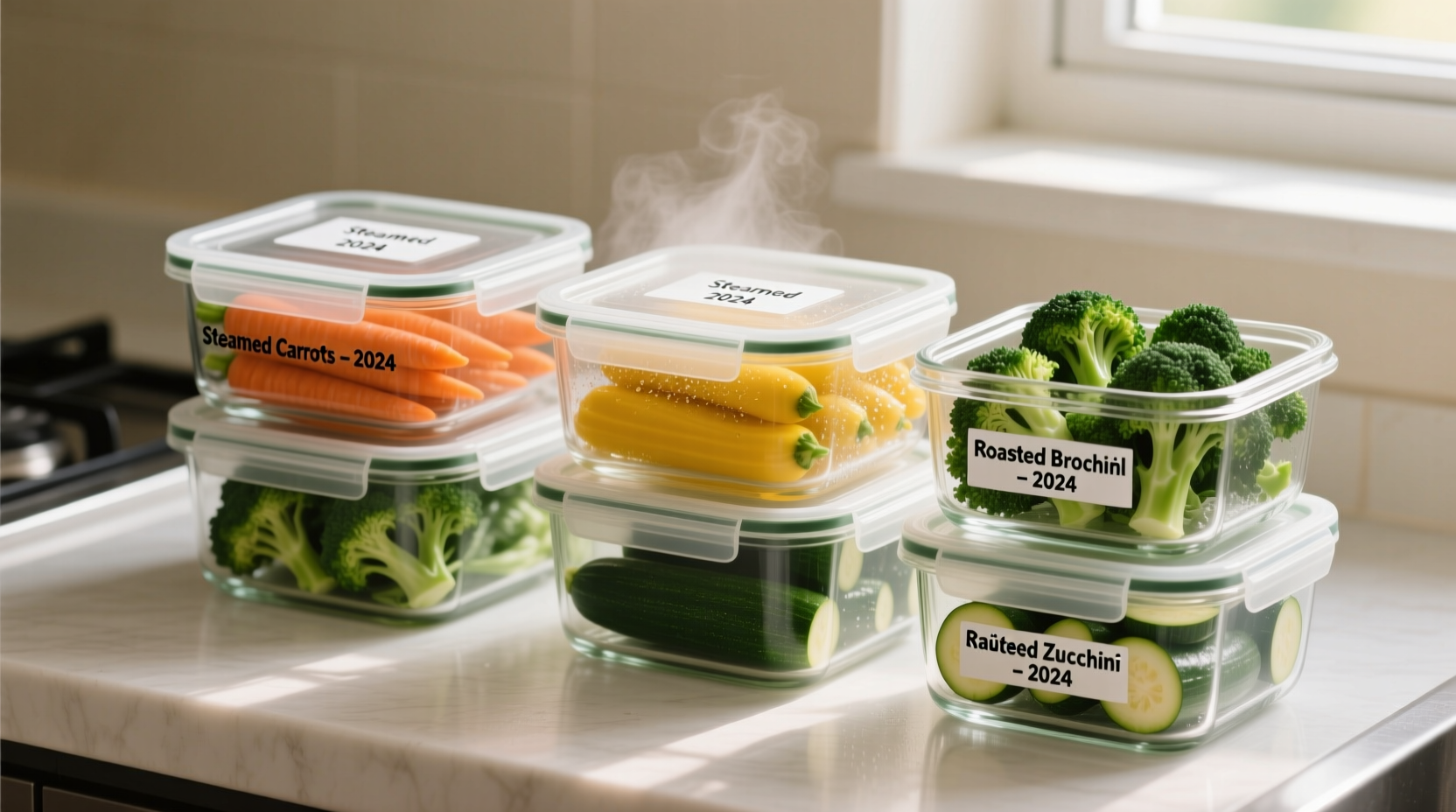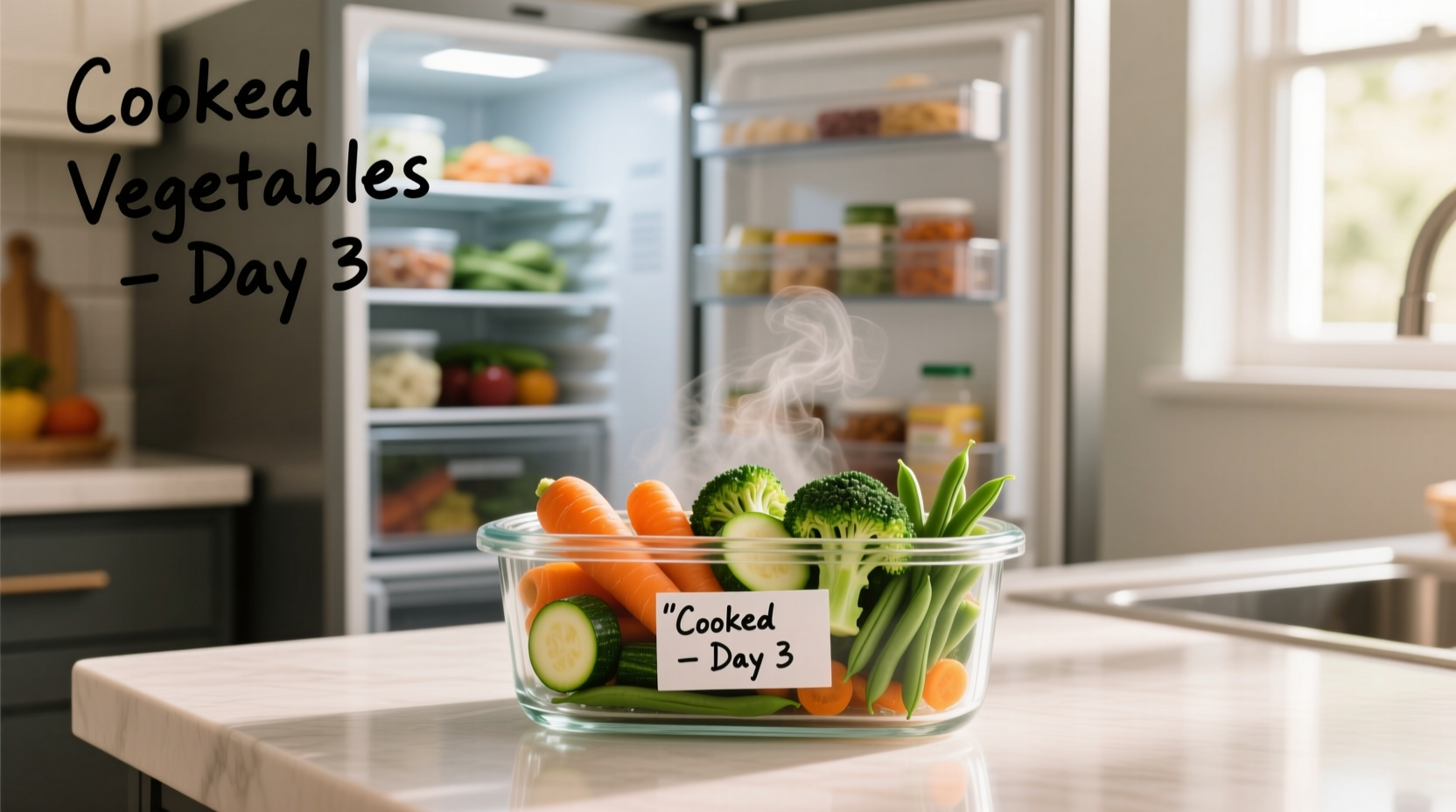Understanding how long your cooked vegetables will last isn't just about avoiding food waste—it's a critical food safety concern. As someone who's worked in professional kitchens and taught home cooks for over 15 years, I've seen how improper storage leads to unnecessary illness and wasted meals. Let's explore the science-backed guidelines that keep your leftovers both safe and delicious.
Why Cooked Vegetables Have Limited Refrigerator Lifespan
When vegetables cook, their cell walls break down, making nutrients more accessible—not just to you, but to bacteria as well. The USDA Food Safety and Inspection Service explains that cooked vegetables enter the "temperature danger zone" (40°F-140°F) where bacteria like Salmonella and Listeria multiply rapidly.
Unlike raw vegetables with intact protective layers, cooked varieties have moisture-rich environments perfect for bacterial growth. This is why proper cooling and storage techniques significantly impact how long will cooked vegetables last in the refrigerator.
Vegetable-Specific Shelf Life Guidelines
| Vegetable Type | Refrigerator Lifespan | Critical Storage Notes |
|---|---|---|
| Leafy Greens (spinach, kale) | 3-4 days | Store in paper towel-lined container to absorb excess moisture |
| Cruciferous (broccoli, cauliflower) | 4-5 days | Store stems down in small water container like fresh flowers |
| Root Vegetables (carrots, potatoes) | 5-7 days | Keep in original packaging or perforated bags |
| Squash & Zucchini | 3-4 days | High moisture content requires extra drying before storage |
| Starchy Vegetables (corn, peas) | 4-5 days | Best stored in glass containers to prevent odor absorption |
This Clemson University Cooperative Extension data shows why "how long do cooked vegetables last in the fridge" requires vegetable-specific answers. The moisture content and natural sugar levels directly impact bacterial growth rates.
Maximizing Your Cooked Vegetables' Refrigerator Lifespan
Professional kitchens follow these evidence-based practices to extend how long cooked vegetables last in the refrigerator while maintaining food safety:
Proper Cooling Techniques
Never place hot food directly in your refrigerator—this raises the internal temperature and creates condensation. Instead:
- Cool cooked vegetables to 70°F within 2 hours using shallow containers (no deeper than 2 inches)
- Place containers in an ice bath while stirring frequently for rapid, even cooling
- Transfer to refrigerator once cooled to room temperature (about 70°F)
Optimal Storage Containers
The container you choose dramatically affects how many days cooked vegetables last in the refrigerator:
- Glass containers with airtight seals preserve freshness longest (5-7 days)
- BPA-free plastic containers work well but may absorb strong odors (4-5 days)
- Avoid aluminum foil for acidic vegetables like tomatoes which react with metal
- Never store in original takeout containers which aren't designed for food safety

Refrigerator Placement Matters
Your refrigerator isn't uniformly cold. For optimal cooked vegetable storage:
- Store in the main compartment, not the door where temperature fluctuates
- Place toward the back where temperatures remain most consistent
- Maintain refrigerator at exactly 37°F (3°C) using an independent thermometer
- Leave space between containers for proper air circulation
Recognizing When Cooked Vegetables Have Spoiled
When determining how long cooked vegetables last in the refrigerator, your senses provide the final verdict. Discard immediately if you notice:
- Visual changes: Slimy texture, unusual discoloration, or mold growth (even in small spots)
- Odor changes: Sour, rotten, or fermented smells beyond the vegetable's natural aroma
- Texture changes: Mushiness beyond normal cooking softness or excessive liquid separation
The FDA Food Code emphasizes that "when in doubt, throw it out" isn't just a saying—it's a critical food safety practice. Never attempt to salvage partially spoiled cooked vegetables by cutting away moldy portions.
Special Considerations for Meal Preppers
If you're wondering how long cooked vegetables last in the refrigerator for meal prep purposes, consider these professional strategies:
- Batch cooking smartly: Cook vegetables separately by type since they have different shelf lives
- Freezing for extended storage: Most cooked vegetables freeze well for 8-12 months (blanch first for best results)
- Reviving leftovers: Add moisture when reheating (a splash of broth or water) to restore texture
- Strategic meal planning: Schedule vegetable-heavy meals earlier in the week when freshness matters most
Remember that reheating doesn't eliminate all bacteria that may have developed during improper storage. The FoodSafety.gov recommends reheating leftovers to 165°F to ensure safety, but this won't reverse spoilage that's already occurred.
Common Misconceptions About Cooked Vegetable Storage
Based on my experience teaching thousands of home cooks, these misconceptions frequently lead to food waste or safety issues:
- "If it smells okay, it's safe": Many dangerous bacteria don't produce noticeable odors
- "The 5-second rule applies to leftovers": Bacteria transfer instantly to moist foods
- "All vegetables last the same time": Starchy vegetables generally outlast leafy greens by 2-3 days
- "Freezing stops the clock completely": Quality degrades over time even in freezer storage
Understanding these realities helps you make informed decisions about how long cooked vegetables last in the refrigerator without compromising safety.
When in Doubt, Follow the Two-Hour Rule
The most important food safety principle isn't about refrigerator storage at all—it's about what happens before refrigeration. Perishable foods, including cooked vegetables, shouldn't remain in the temperature danger zone (40°F-140°F) for more than two hours (or one hour if room temperature exceeds 90°F).
This critical window directly impacts how many days cooked vegetables last in the refrigerator. Vegetables cooled properly within this timeframe will consistently reach the upper end of their shelf life spectrum, while those left out too long will spoil faster regardless of subsequent refrigeration.
Practical Summary: Making Your Leftovers Last
To maximize how long cooked vegetables last in the refrigerator while ensuring safety:
- Cool properly within 2 hours using shallow containers
- Store in airtight glass containers in the coldest part of your refrigerator
- Consume leafy greens within 3-4 days, starchy vegetables within 5-7 days
- Trust your senses—discard anything showing spoilage signs
- When meal prepping, freeze portions you won't eat within 4 days
By following these evidence-based practices, you'll minimize food waste while keeping your family safe. Remember that food safety guidelines for how long cooked vegetables last in the refrigerator exist for good reason—they're based on decades of food science research designed to protect you.











 浙公网安备
33010002000092号
浙公网安备
33010002000092号 浙B2-20120091-4
浙B2-20120091-4